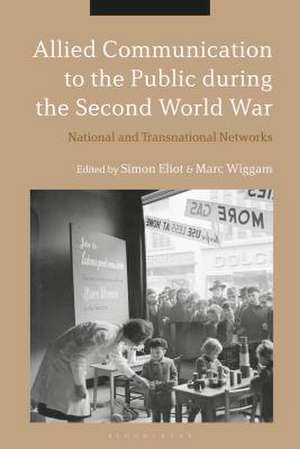Allied Communication to the Public During the Second World War: National and Transnational Networks
Editat de Professor Emeritus Simon Eliot, Dr. Marc Wiggamen Limba Engleză Hardback – 13 noi 2019
Preț: 657.29 lei
Preț vechi: 943.58 lei
-30% Nou
Puncte Express: 986
Preț estimativ în valută:
125.78€ • 129.95$ • 104.63£
125.78€ • 129.95$ • 104.63£
Carte tipărită la comandă
Livrare economică 19 martie-02 aprilie
Preluare comenzi: 021 569.72.76
Specificații
ISBN-13: 9781350105126
ISBN-10: 1350105120
Pagini: 248
Ilustrații: 2 bw illus
Dimensiuni: 156 x 234 x 22 mm
Greutate: 0.54 kg
Editura: Bloomsbury Publishing
Colecția Bloomsbury Academic
Locul publicării:London, United Kingdom
ISBN-10: 1350105120
Pagini: 248
Ilustrații: 2 bw illus
Dimensiuni: 156 x 234 x 22 mm
Greutate: 0.54 kg
Editura: Bloomsbury Publishing
Colecția Bloomsbury Academic
Locul publicării:London, United Kingdom
Caracteristici
It offers a truly transnational approach to Allied communications, with chapters on Germany, Iberia, the Arab world and India
Notă biografică
Simon Eliot is Professor Emeritus of the History of the Book at the School of Advanced Study, University of London, UK. He is a general editor of The History of Oxford University Press (2014) and the co-editor of A Companion to the History of the Book (2009), with Jonathan Rose. He has just directed an AHRC-funded project on the history of the Ministry of Information, 1939-46.Marc Wiggam is Senior Lecturer in International History at the University of Oslo. He is the author of The Blackout in Britain and Germany, 1939-1945 (2018).
Cuprins
List of IllustrationsForeword, David Welch (University of Kent, UK)1. Introduction, Simon Eliot (SAS, University of London, UK) and Marc Wiggam (University of Oslo, Norway)2. The Ministry of Information on the British Home Front, Henry Irving (Leeds Beckett University, UK)3. Lend to Defend: The National Savings Committee during the Second World War, Victoria Carolan (University of Greenwich, UK)4. A Citizen-Soldier 'Must Know What He Fights For and Love What He Knows': The work of the Army Bureau of Current Affairs between 1941 and 1945, Stephen Thompson (SAS, University of London, UK)5. Britain To-day, Bulletins from Britain and Britain: some semi-official British periodicals in the USA during World War Two, Alice Byrne (Aix-Marseille University, France)6. Teamwork: Carlton Moss, US Propaganda Film, and the Fight for Black Visibility in WWII, Joseph Clark (Simon Fraser University, Canada)7.Allied War Correspondents' Resistance to Political Censorship in World War II, Richard Fine (Virginia Commonwealth University, USA)8. 'The Rot Must Be Stopped Even At The Cost of Some Public Discussion': Antisemitism in the Polish Forces as a Crisis of Policy and Public Information, Jim Wald (Hampshire College, USA)9. 'For a German Audience We Do Not Use Appeals for Sympathy on Behalf of Jews as a Propaganda Line': The BBC German Service and the Holocaust, 1938-1945, Stephanie Seul (University of Bremen, Germany)10. Inventing a New Kind of German: The BBC German Service and the Bombing War, Emily Oliver (University of Warwick, UK)11. Diverging Neutrality in Iberia: The British Ministry of Information in Spain and Portugal during the Second World War, Christopher Bannister (University of Manchester, UK)12. 'Innocent Efforts': The Brotherhood of Freedom in the Middle East during World War II, Stefanie Wichhart (Niagara University, USA)13. 'The Meek Ass Between Two Burdens'? The BBC and India during the Second World War, Chandrika Kaul (University of St Andrews, UK)Index
Recenzii
A test of an academic work of this nature is whether it provokes an "I didn't know that!" response. Simon Eliot and Marc Wiggam are to be thanked for compiling an anthology that will clear that hurdle for anyone interested in Second World War propaganda and manufactured consent.
